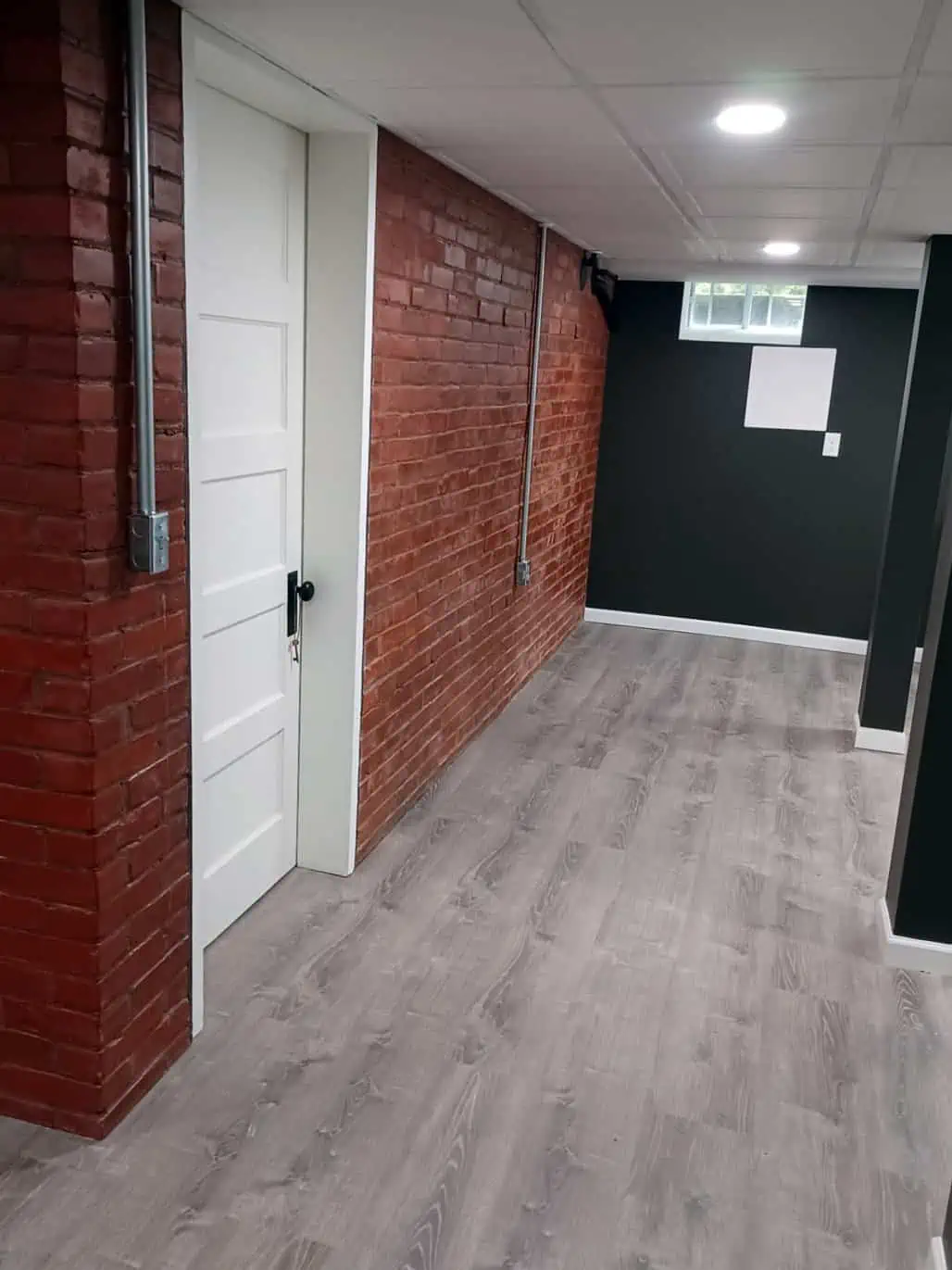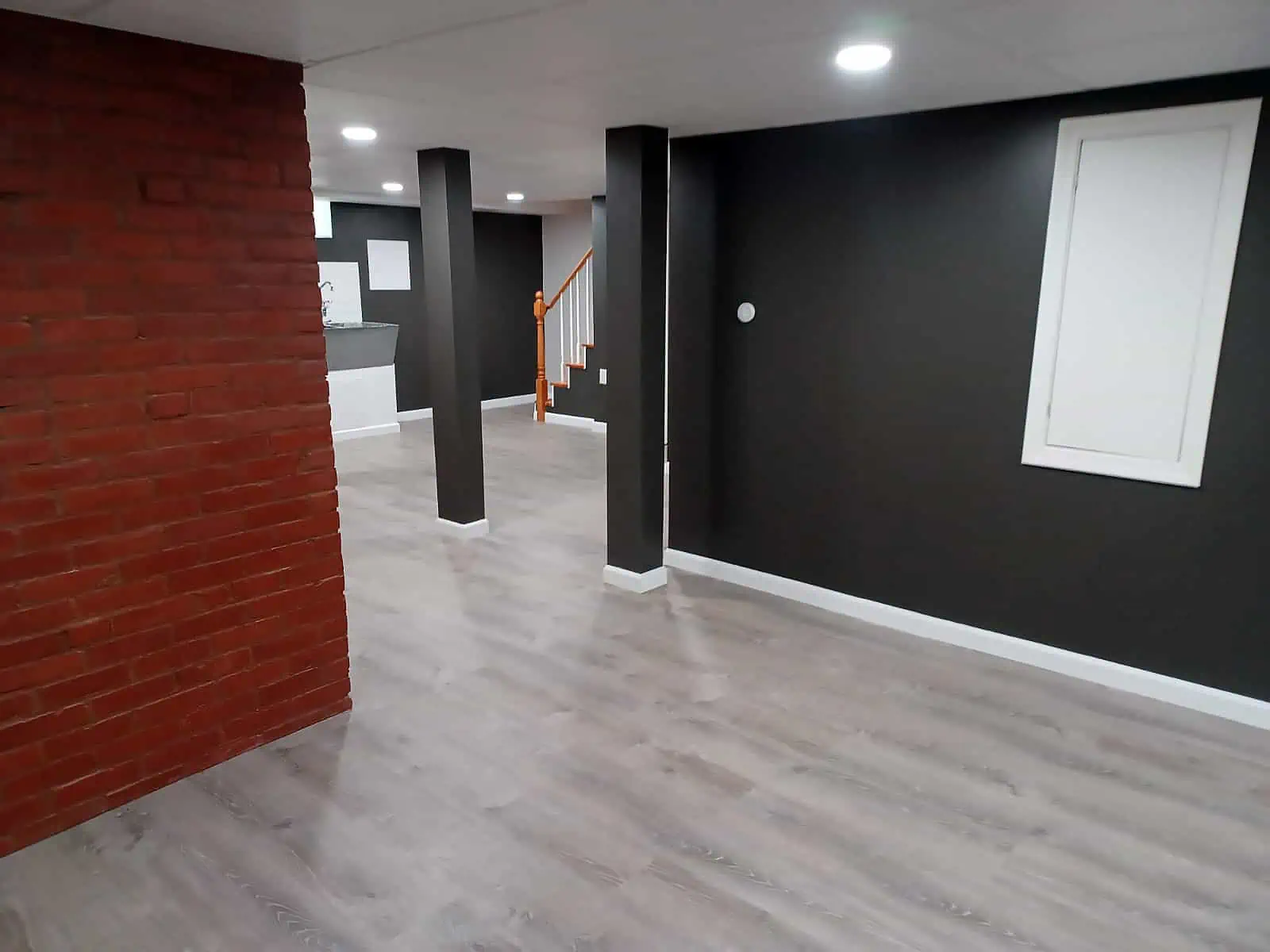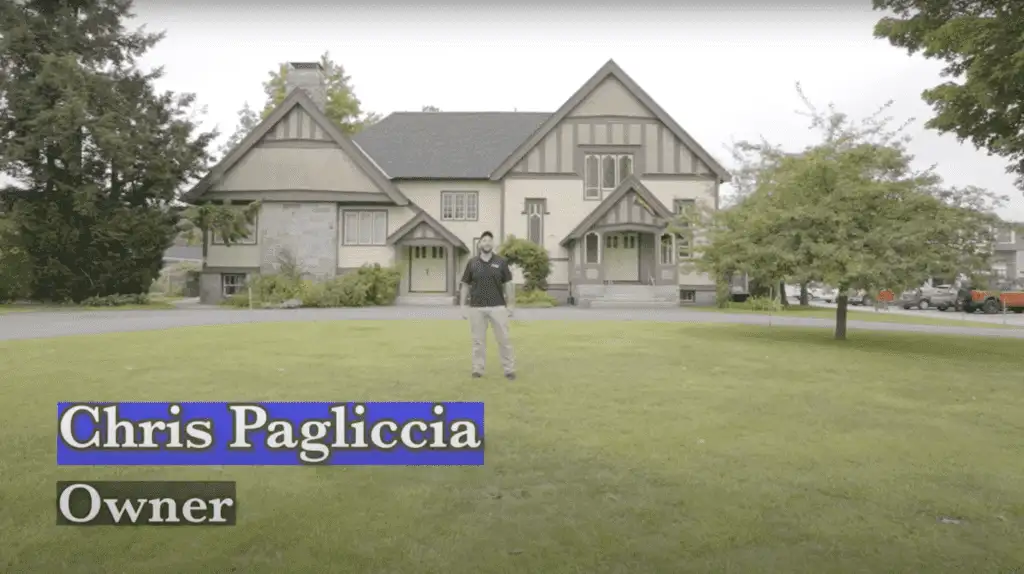Basement Finishing South Berwick ME
Transforming your basement from a cold, unused space into something functional adds value to your home. In South Berwick, ME, where seasons can feel long, making the most of every square foot can improve both comfort and property appeal. The right basement finishing project can turn that ignored area into a family room, a home office, or even a private retreat.
Real People - Real Great Results
Crawl Space Video Playlist

0:53

1:30

1:34

0:55
Why Finish Your Basement?
You’ve already got the space—it’s just begging to be useful. Finishing your basement in South Berwick, ME, isn’t just about aesthetics; it’s about making your home work harder for you. Think about it: a project like this takes hardware-store practicality and turns it into something lifestyle-worthy.
Adding usable square footage is the obvious advantage. Whether you’ve got a growing family, a work-from-home job, or an itch to finally start that home theater you keep talking about, turning an unfinished storage zone into livable space lets you max out your home’s potential without tacking on an expensive addition. Unless you’re keen to pour your savings into leveling up the first and second floors, your basement is already sitting there—waiting.
Then there’s the value boost. South Berwick homes with finished basements stand out, especially in the resale market. Buyers love the idea of “extra room,” and finished basements deliver it on a silver platter. Even if you’re not planning to sell anytime soon, that added marketability isn’t a bad card to keep in your back pocket.

Basements also give you the chance to create something specialized. Not every room in your home needs to be multipurpose. Let the kids wage their LEGO wars in a designated playroom downstairs, or build out a home gym so you can stop pretending you’re going to hit the actual gym after work. Want a reading nook or a music studio? This is your canvas.
On the utility side, proper basement finishing in South Berwick also means solving some issues before they snowball into expensive problems. Insulation and sealing during the project do more than keep your toes warm—they make your entire home more energy-efficient. And addressing moisture issues as part of the process? That’s not just smart; it’s necessary. Unfinished basements are notorious for dampness, and if you ignore it, you’re inviting mold and structural damage to the party.
In short, finishing your basement isn’t just a project—it’s an upgrade to how you live in your home. You’re fixing problems, creating opportunities, and banking value all at once. If you ask us, that’s a no-brainer.
Assessing Your Basement
Before hammer ever meets nail, assessing your basement is step one. It might be a future dream space, but right now, it’s raw territory—and raw territory has surprises. Dive in with these essentials:
- Check for Moisture: Basements and moisture go together like Maine winters and snow. Look for telltale signs—discoloration on walls, a damp smell, or even subtle bubbling in paint or concrete. If water’s creeping in now, finishing the space will only make things worse later. A moisture meter is worth every penny here.
- Evaluate Ceiling Height: South Berwick building codes require basements to meet specific height requirements, usually around seven feet. Some older homes may fall shy of this, and lowering the floor or adjusting beams isn’t a cheap fix. Measure in multiple places—settling can make a big difference between one end of the room and the other.
- Inspect Structural Integrity: Hairline cracks in walls might be no big deal, but wider gaps or bowing can mean the foundation’s under stress. Similarly, sagging beams or joists overhead could indicate trouble upstairs. Bring in a structural engineer if anything looks suspicious. This isn’t the place to guess.
- Review Local Codes: South Berwick regulations are non-negotiable. Emergency egress requirements, insulation specifics, and permits will set the project’s framework. Ignoring them isn’t just risky—it could void your insurance or tank your resale value. Take a minute to check with the town office or hire someone who knows the ropes.
An honest assessment now might feel like a buzzkill, but it’s better than discovering you’re knee-deep in water—or red flags—mid-project. Don’t skip it.
Budgeting for Basement Finishing South Berwick ME
Understanding your financial boundaries is critical before starting any basement finishing project. A realistic budget not only keeps your costs manageable but also helps you make smarter choices about materials, labor, and overall design. Here’s how to approach it.
Average Costs in South Berwick
The cost to finish a basement in South Berwick typically ranges between $10,000 and $30,000, depending on the size, scope, and quality of materials. If you’re envisioning simple upgrades—basic drywall, laminate flooring, and minimal electrical work—you’ll likely be on the lower end. High-end finishes like custom cabinetry, hardwood flooring, or a fully plumbed bathroom will push you closer to the top of that range. Keep in mind that larger basements or those requiring significant structural work may exceed these figures.
Material Choices
Your selection of materials will have the most noticeable impact on both your budget and the final aesthetic.
- Budget-Friendly Options: Drywall, vinyl flooring, and stock cabinetry are cost-effective and easy to install. These materials look good without breaking the bank, making them ideal for straightforward family rooms or play areas.
- Premium Choices: For a more sophisticated feel, consider hardwood or tile flooring, custom millwork, and specialty lighting. Premium options elevate the look but can quickly escalate expenses.
Labor Costs
Labor is another significant chunk of your budget. While South Berwick has a steady pool of contractors, rates for professionals are generally in line with national averages. For specialized tasks like electrical wiring, plumbing, or HVAC upgrades, it’s worth investing in licensed professionals to ensure safety and compliance with local codes. However, you can offset some costs by tackling easy DIY projects, such as painting walls or installing basic fixtures.
Hidden Costs
Basement finishing is rarely as straightforward as it appears. Be prepared for extra expenses to pop up along the way:
- Waterproofing: Many South Berwick homes have basements that deal with moisture issues due to seasonal precipitation and soil conditions. Proper drainage systems, sealing cracks, and dehumidifiers add to upfront costs but save you long-term headaches.
- Permits: Local regulations in South Berwick require permits for major renovations, including finishing a basement. These can cost anywhere from $50 to several hundred dollars, depending on the complexity of the project.
- Unforeseen Repairs: Once you start tearing into walls or floors, surprises like mold, foundation cracks, or outdated wiring can derail your budget. Experts recommend setting aside at least 10–15% of your budget for contingencies.
Smart Money-Saving Tips
To keep your basement finishing project financially sensible, consider these strategies:
- Prioritize Upgrades: Focus on the areas that will give you the most personality or functionality—like a well-lit family room or a cozy office—and leave less critical features, like a bathroom, for a future phase.
- Repurpose Existing Items: Use furniture or shelving you already own to furnish the space after renovations are complete.
- Plan Ahead: Research contractor quotes and material prices thoroughly to avoid costly last-minute changes.
By taking a measured approach, defining your must-haves, and leaving room for unexpected expenses, you can transform your basement into a beautiful, functional space without financial regret.

Basement Finishing Design Ideas
A finished basement can transform into nearly anything you need it to be. In South Berwick, where seasons command a cozy indoor retreat, your basement has untapped potential waiting to be unlocked. Below are some practical and inspiring design ideas to help guide your renovation project.
- Family Room: Give your basement a soft, welcoming vibe with comfy sectional seating, an entertainment center, and warm lighting. Use neutral tones and texture-heavy fabrics to create a space that invites movie marathons and board games on rainy New England nights.
- Home Office: With remote work here to stay, carving out a quiet, functional workspace makes sense. Think strategic desk placement for natural light (if there’s a window), sound-muffling materials, and extra outlets for your tech setup. Built-in shelving and smart storage will keep clutter in check.
- In-Law Suite: Have extended family or frequent guests? A cozy bedroom with its own bathroom and mini kitchenette can make their stay feel special—whether for the weekend or a longer stint. Stick to practical flooring like laminate or vinyl for easy cleaning but add plush rugs to soften the look.
- Home Gym: Why drive to the gym when you can bring it to your basement? Install rubber mat flooring, wall mirrors to check form, and an open layout to accommodate weights, yoga mats, or cardio equipment. Add hooks or shelves for organizing resistance bands and other accessories.
- Playroom: Every parent could use a designated zone for toys, games, and wild imaginations. Opt for soft flooring like foam mats or carpet squares and include built-in storage bins to avoid chaos. A chalkboard wall or whiteboard panel is a fun touch that doubles as creative space for the kids.
Ultimately, the best design idea for your South Berwick basement is the one that complements your lifestyle and enhances how you use your home. Take the time to plan thoughtfully—the results will speak for themselves.
Addressing Common Challenges
South Berwick basements can face unique challenges during finishing projects. Here’s how to handle them:
- Moisture Control: Dampness is the enemy of any basement project. Start by identifying the source—most often poor drainage around the foundation or small cracks letting water seep through. Install perimeter drains or a sump pump if necessary. Dehumidifiers are also a must, and applying waterproof paint on walls adds an added layer of defense. If the problem is chronic, consult a professional specializing in basement waterproofing before proceeding.
- Lighting: Basements rarely boast an abundance of natural light, so you’ll need to overcompensate. Recessed lighting is a game-changer—flush against the ceiling and bright enough to make the space feel open. Pair this with pale, reflective wall colors to spread light. If your layout allows, consider cutting in a few glass block windows for a touch of natural light without compromising privacy or insulation.
- Low Ceilings: Many South Berwick basements have less-than-ideal ceiling heights that make the space feel cramped. Tactics like painting the ceiling a light color or exposing beams for an industrial look can trick the eye into perceiving more height. Avoid adding bulky structures in your design; low-profile furniture and flush lighting work best. If you can afford the investment, lowering the basement floor is another option to gain headroom, though it’s a more structural and expensive undertaking.
- Ventilation: Stuffy air can ruin even the most beautifully finished basement. Add vents to tie into your home’s HVAC system for consistent airflow, or consider standalone air exchangers or fans if that’s not an option. Venting outside any appliances, like dryers or stoves in an in-law suite, is mandatory for both air quality and safety. With some effort, you can keep the space comfortable all year round.
Basement finishing comes with hurdles, but they aren’t insurmountable. A bit of planning and forethought turns potential obstacles into opportunities for a smarter, more enduring design.
DIY vs. Hiring Professionals
When it comes to finishing your basement, the question isn’t whether you can do it yourself—it’s whether you should. A basement renovation involves a mix of straightforward and highly technical tasks, and knowing where to draw the line can save you time, money, and frustration.
DIY-Friendly Tasks
If you’re comfortable wielding power tools or have some weekend warrior experience, there are parts of the project you can handle without breaking a sweat:
- Basic Framing: Putting up walls and partitions is a relatively simple task with the right tools and measurements. Just be sure to follow your local building codes.
- Painting: Rolling on paint is as DIY as it gets, and choosing lighter shades can make the space feel bigger and brighter.
- Flooring: Peel-and-stick vinyl or snap-together laminate flooring are manageable even for first-timers, offering budget-friendly and stylish solutions.
Taking on these simpler tasks can cut down labor costs and leave more room in your budget for the areas that demand professional expertise.

When To Call the Pros
Some tasks are better left to licensed professionals—not only for safety reasons but also to ensure the job is done right the first time:
- Electrical Work: Wiring outlets, installing light fixtures, or upgrading your electrical panel isn’t just risky—it’s regulated. In South Berwick, ME, proper permits and inspections are required, meaning shortcuts simply aren’t an option.
- Plumbing: Adding a bathroom or wet bar to your basement involves precision and adherence to local codes. Improper plumbing can lead to leaks, backups, and costly damage over time.
- Structural Challenges: If your basement has sagging joists, foundation cracks, or needs beam reinforcement, you’ll need an expert’s eye to ensure the space is safe and sound.
Code Compliance: Speaking of codes—South Berwick has specific building regulations about ceiling height, egress windows, and fire safety. A professional contractor will navigate these requirements with ease, preventing any surprises during inspections.
The Hybrid Approach
For many homeowners, a hybrid approach strikes the perfect balance. Handle the easier tasks—like painting walls or assembling furniture—while leaving the heavy lifting and technical work to the pros. Not only will this approach save money, but you’ll also avoid the stress of tackling complex problems without the right expertise. In short, know your strengths. A little elbow grease can go a long way in stretching your budget, but when it comes to permits, pipes, and wiring, your future self will thank you for making the call.
Maintaining Your Finished Space
Congratulations, your basement is finished. But the work doesn’t end with the last coat of paint. Proper maintenance is essential to protect your investment and keep the space comfortable and functional over time. Here’s how to stay ahead of potential issues:
- Control Humidity: Basements are naturally prone to dampness, even with the best sealing and waterproofing. Use a dehumidifier to keep humidity levels between 30-50%, especially during South Berwick’s humid summer months. Pay attention to musty odors—they’re often the first sign that moisture levels are creeping up.
- Watch for Leaks or Cracks: Make it a habit to inspect the walls and floors every few months. South Berwick’s seasonal temperature swings can cause slight ground shifts, leading to new cracks over time. Catching water seepage early helps prevent expensive damage and mold growth.
- Deep Clean Periodically: Basements, especially those with carpet or high-use spaces like gyms or playrooms, tend to collect dust and allergens faster than other parts of the home. Schedule a thorough cleaning a few times a year, including vacuuming, mopping, and wiping down surfaces to keep the space fresh and healthy.
- Monitor Air Circulation: Good airflow is critical in a sub-level space. Clean HVAC filters regularly and consider adding an air purifier for spaces that seem stuffy or prone to lingering odors. If you notice condensation on windows or walls, reevaluate your ventilation system.
- Stay Ahead of Wear and Tear: Furniture, flooring, and walls in a basement often endure heavier use as the space tends to be multi-functional. Touch up paint, mend scuffs, and rotate furniture (if possible) to distribute wear evenly.
By sticking to a simple maintenance routine, you’ll not only extend the life of your finished basement but also ensure it remains an asset to your home—whether it’s your cozy family hangout or the go-to spot for hosting friends.
Conclusion
Finishing your basement in South Berwick, ME, is more than just a home improvement project—it’s a calculated move to maximize utility and comfort. Whether you’re looking to add a cozy family room, a high-functioning workspace, or a private retreat, the potential of that underutilized space is limitless with the right vision and effort. However, the key to success lies in the details: addressing moisture, planning for efficient lighting, and following local codes.
By balancing smart budgeting with professional help where it counts, you can create a basement that not only serves your current needs but also enhances the long-term value of your home. A well-finished basement isn’t just another room—it’s a testament to making your home work better for your life. Plan methodically, build thoughtfully, and enjoy what could become your favorite space in the entire house.
Reviews from Happy Customers
Our top priority is customer satisfaction, and we work closely with clients to understand their unique needs and goals.



